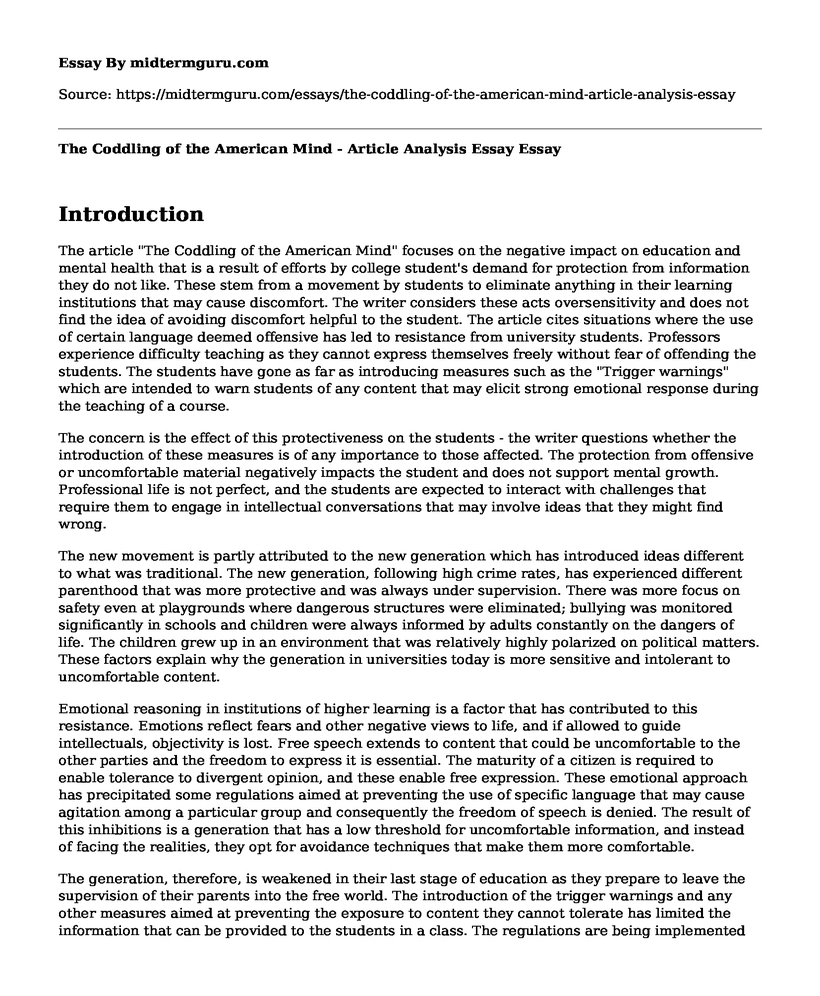Introduction
The article "The Coddling of the American Mind" focuses on the negative impact on education and mental health that is a result of efforts by college student's demand for protection from information they do not like. These stem from a movement by students to eliminate anything in their learning institutions that may cause discomfort. The writer considers these acts oversensitivity and does not find the idea of avoiding discomfort helpful to the student. The article cites situations where the use of certain language deemed offensive has led to resistance from university students. Professors experience difficulty teaching as they cannot express themselves freely without fear of offending the students. The students have gone as far as introducing measures such as the "Trigger warnings" which are intended to warn students of any content that may elicit strong emotional response during the teaching of a course.
The concern is the effect of this protectiveness on the students - the writer questions whether the introduction of these measures is of any importance to those affected. The protection from offensive or uncomfortable material negatively impacts the student and does not support mental growth. Professional life is not perfect, and the students are expected to interact with challenges that require them to engage in intellectual conversations that may involve ideas that they might find wrong.
The new movement is partly attributed to the new generation which has introduced ideas different to what was traditional. The new generation, following high crime rates, has experienced different parenthood that was more protective and was always under supervision. There was more focus on safety even at playgrounds where dangerous structures were eliminated; bullying was monitored significantly in schools and children were always informed by adults constantly on the dangers of life. The children grew up in an environment that was relatively highly polarized on political matters. These factors explain why the generation in universities today is more sensitive and intolerant to uncomfortable content.
Emotional reasoning in institutions of higher learning is a factor that has contributed to this resistance. Emotions reflect fears and other negative views to life, and if allowed to guide intellectuals, objectivity is lost. Free speech extends to content that could be uncomfortable to the other parties and the freedom to express it is essential. The maturity of a citizen is required to enable tolerance to divergent opinion, and these enable free expression. These emotional approach has precipitated some regulations aimed at preventing the use of specific language that may cause agitation among a particular group and consequently the freedom of speech is denied. The result of this inhibitions is a generation that has a low threshold for uncomfortable information, and instead of facing the realities, they opt for avoidance techniques that make them more comfortable.
The generation, therefore, is weakened in their last stage of education as they prepare to leave the supervision of their parents into the free world. The introduction of the trigger warnings and any other measures aimed at preventing the exposure to content they cannot tolerate has limited the information that can be provided to the students in a class. The regulations are being implemented in learning institutions and are denying students vital skills on the handling of situations in the professional spheres. The result is a student with the inadequate ability to tackle new challenges in an environment where they do not dictate the terms of engagement. The students develop cognitive distortions which include negative prediction of outcomes and insecurities. The student is not capable of receiving new information contrary to what they previously did. The student develops ideas and is incapable of tolerating any information that is contrary to their fears. The conclusion is that the coddling of the student's minds leads to poor development intellectually and emotionally (Greg and Haidt).
Works Cited
Greg, Lukianoff and Jonathan Haidt. "The Coddling of the American Mind." The Atlantic (2015).
Cite this page
The Coddling of the American Mind - Article Analysis Essay. (2022, Nov 02). Retrieved from https://midtermguru.com/essays/the-coddling-of-the-american-mind-article-analysis-essay
If you are the original author of this essay and no longer wish to have it published on the midtermguru.com website, please click below to request its removal:
- Use of English and Communication Factors in Hospitality in Kazakhstan
- Review of the Book Other Peoples Children: Cultural Conflict in the Classroom
- Visiting Seville and Madrid in Spain - Essay Example
- Essay Sample on Independence of America
- The Psychology of Adolescence - Research Paper
- School Violence: Unprepared Teachers, Vulnerable Students - Research Paper
- Personality Traits: From Hippocrates to Behavioral Genetics - Essay Sample







